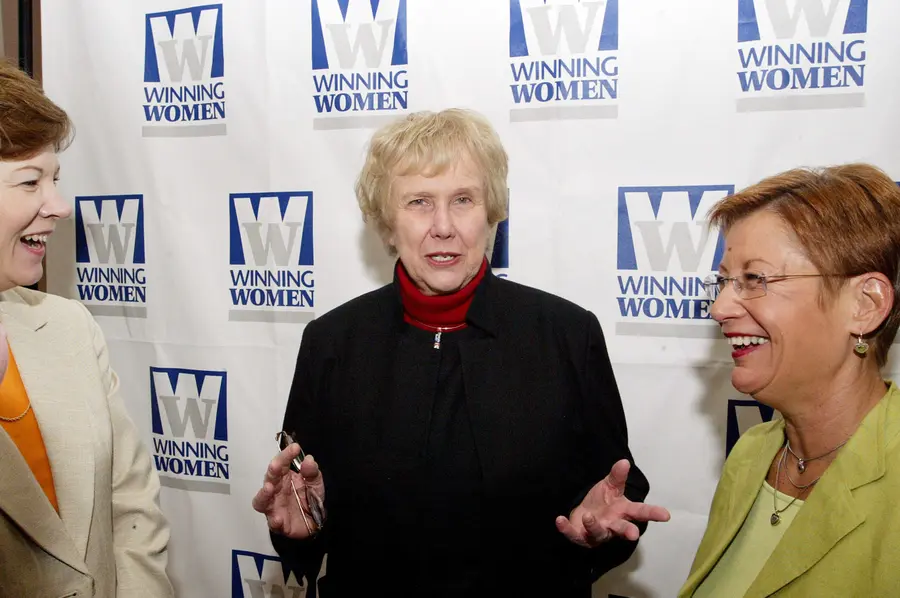What is Ellen Gordon's net worth?
Ellen Gordon is an American businesswoman who has a net worth of $1.5 billion. Ellen Gordon is best known as the longtime president, chairman, and chief executive officer of Tootsie Roll Industries. Over the course of more than five decades, she has guided the confectionery company through changing consumer tastes, shifting market conditions, and waves of industry consolidation, while maintaining its independence as a family-run enterprise.
Born into the Rubin family, which took control of the Sweets Company of America in the 1930s, Gordon's ties to Tootsie Roll run deep. In 1950 she married Melvin Gordon, a Harvard graduate who joined the company's board in 1952. When Ellen's father, William Rubin, fell ill in 1962, the couple assumed leadership together — Melvin became CEO while Ellen was appointed president and chief operating officer. They ran the business as equals for more than 50 years, building it into a quirky but enduring candy empire. Under their stewardship, Tootsie Roll acquired Charleston Chew, Junior Mints, Sugar Babies, Charms Blow Pops, Dubble Bubble, and more, all while maintaining its independence against takeover attempts from Hershey, Mars, and Nestlé. Known for avoiding interviews and shunning Wall Street norms, Gordon has kept Tootsie Roll quietly profitable and remarkably stable.
Early Life
Ellen Rubin was born in 1932 into a family deeply connected to the candy trade. After the Sweets Company of America — the original maker of Tootsie Rolls — went public in 1922, members of the Rubin family began buying stock. By the 1930s, they had gained control of the company. Ellen's uncle, Bernard D. Rubin, became president in 1935, revitalizing the struggling business, and her father, William B. Rubin, later took over, expanding sales and restoring profitability.
Ellen studied economics and business administration, completing graduate-level coursework at Harvard. At a time when few women pursued corporate careers, she considered a future in business unlikely but ultimately followed her family's path. In 1950, she married Melvin Gordon, a fellow Harvard graduate who would become her lifelong business partner at Tootsie Roll. Together, they raised four daughters while steadily preparing to take on leadership of the company.
Corporate History of Tootsie Roll
The origins of Tootsie Roll date back to 1896, when Austrian immigrant Leo Hirshfield opened a candy shop in New York City and set out to solve a problem: traditional chocolate melted too easily in the summer heat. After months of experimenting, he created a chewy, taffy-like candy with a chocolate flavor that could withstand heat and stay affordable for children. He named it after his daughter Clara, whose nickname was "Tootsie."
The candy was an instant success. By 1917, the company had been renamed the Sweets Company of America, and in 1922, it became one of the rare candy makers listed on the New York Stock Exchange. A few years later, the introduction of the Tootsie Pop in 1931 turned the brand into a Depression-era favorite, offering consumers a small indulgence at a time when money was scarce.
Financial troubles in the 1930s brought new leadership. In 1935, Bernard D. Rubin, Ellen Gordon's uncle, staged a takeover. He enlarged the size of the candy, adjusted the formula to make it taste more chocolatey, and relocated production to Hoboken, New Jersey, where costs were lower. His timing was fortuitous: during World War II, Tootsie Rolls were included in U.S. military rations because they could survive both heat and cold. The exposure cemented the brand's place in American culture. By the time Rubin died in 1948, revenues had increased more than tenfold, and leadership passed to Ellen's father, William B. Rubin.
When William's health declined in 1962, his son-in-law Melvin Gordon stepped in as chief executive, while Ellen Gordon was named president and chief operating officer. That same year, the company officially adopted the name Tootsie Roll Industries. Over the next five decades, Ellen and Melvin turned the business into a diversified candy empire, acquiring Charleston Chew, Junior Mints, Sugar Babies, Sugar Daddies, DOTS, Charms Blow Pops, Cella's chocolate-covered cherries, Dubble Bubble gum, and Andes mints.
Despite repeated approaches from larger rivals such as Hershey, Mars, and Nestlé, the Gordons refused to sell. They built a reputation for secrecy, avoiding analyst calls, shunning press interviews, and filing bare-bones quarterly reports. Still, the company remained consistently profitable, raised dividends year after year, and became a fixture on Wall Street as one of the few family-controlled public companies that continued to thrive well into the 21st century. Upon Melvin's death in 2015, Ellen became the CEO.

(UPI Photo/Bill Greenblatt via Alamy)
Salary
Ellen Gordon's position as chairman and CEO has been accompanied by notable compensation. In recent years, her total annual pay has typically ranged from $6 million to $7 million, combining salary, bonuses, pension contributions, and other benefits. In 2022, her compensation totaled nearly $6.8 million, with just under $5 million paid in cash and the remainder in pension and perks. Earlier contracts show her base salary was about $1 million in the mid-2000s, supplemented by benefits such as corporate housing and use of a company jet. Unlike many publicly traded companies, Tootsie Roll provides relatively little equity compensation, as most of Gordon's wealth comes directly from her family's controlling stake.
Ownership and Wealth
The Gordon and Rubin families have maintained control of Tootsie Roll Industries for decades, largely through Ellen Gordon's personal holdings. As of recent disclosures, she owns more than 32 million shares of the company, representing roughly 48% of the total outstanding stock. Using the company's average recent market cap of $3.25 billion, that means Ellen's stake is worth $1.5 billion.
/2025/09/ellen-gordon-scaled.jpg)
/2010/05/Robert-Iger.jpg)
/2009/12/GettyImages-85663947.jpg)
/2012/08/bill-wrigley.jpg)
/2010/07/John-Thain.jpg)
/2020/06/taylor.png)
:strip_exif()/2009/09/P-Diddy.jpg)
/2020/04/Megan-Fox.jpg)
/2018/03/GettyImages-821622848.jpg)
:strip_exif()/2015/09/GettyImages-476575299.jpg)
/2019/11/GettyImages-1094653148.jpg)
/2019/04/rr.jpg)
/2009/09/Cristiano-Ronaldo.jpg)
/2019/10/denzel-washington-1.jpg)
/2009/09/Brad-Pitt.jpg)
/2017/02/GettyImages-528215436.jpg)
/2020/01/lopez3.jpg)
/2025/09/ellen-gordon-scaled.jpg)
/2010/05/Robert-Iger.jpg)
/2025/09/ellen-gordon-1-scaled.jpg)
/2009/12/GettyImages-85663947.jpg)
/2020/06/jb2.jpg)
/2012/08/bill-wrigley.jpg)
/2020/01/GettyImages-1055500818.jpg)
/2018/11/CNW-Man-16.png)
/2009/11/George-Clooney.jpg)
/2020/02/Angelina-Jolie.png)